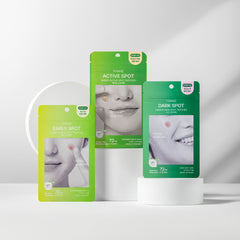What Is Maskne and How to Treat Face Mask Acne Breakouts

In this article :
Unmasking Maskne - Causes, Prevention & Treatment of skin issues caused by wearing face masks
Face Mask + Skin Irritation or Sweat and Dirt = Maskne
Maskne: a phenomenon that is truly a sign of our times. While we’re used to “face mask” referring to our hydrating, anti-aging, skin-restoring products, these days, it’s more common to think of the protective fabric face coverings we wear while social distancing to keep ourselves and others safe. And while those face masks are critical to our health and safety as recommended by the center for disease control (CDC) during the COVID-19 pandemic (COVID), they do not benefit our skin the way our dual mask sets do.
Enter: Maskne, the acne and skin problems brought on by our fabric or medical grade face masks.

What is Maskne?
While health care workers who wear N95 masks regularly are familiar with the maskne phenomenon, those who are new to face masks are startled by the outbreaks we get from wearing them.
Maskne is a broad term for skin conditions such as contact dermatitis, types of acne (like acne mechanica and cystic acne) skin breakouts, irritations, and impurities on the skin where the mask rubs, touches, and covers.
Why Does Maskne Occur?
The causes of maskne are plenty, and usually occur when you’ve been wearing masks for a long period of time. Firstly, as you are breathing hot air inside your mask, the humidity and bacteria from your breath are trapped up against your skin. This creates a warm, humid environment — and an ideal setting for yeast, bacteria and other flora to wreak havoc on your skin and clog your pores. Friction and the rubbing of the fabric against the skin also can cause these unsightly bumps to appear. And if your maskne is itchy and looks more like a rash, you likely have contact dermatitis.
How Can I Prevent Maskne and Treat Face Mask Related Face Acne?
You can prevent against getting mask acne in a few ways:
- Wash Your Mask. Wash your reusable mask regularly to get rid of any excess oil or bacteria trapped in the fabric. Disposable masks are a hygienic, single use option as well.
- Use an SPF Moisturizer. Use a light moisturizer or SPF to prevent friction of the mask rubbing against your skin.
- Skip Makeup. Avoid makeup under your mask. The fabric of the mask can act like a delivery system, driving makeup deep into your skin.
- Get a Face Mask with Softer Fabric. Lightweight, breathable fabrics might be better for your skin, but they are less effective. For this reason, choose a soft fabric instead, for less irritation while it rubs against your skin.
- Use a Gentle Face Cleanser. Washing your face regularly is an important step. Use a good foaming gentle cleanser and be sure to moisturize, as cleansing and treatments like benzoyl peroxide can be drying.
- Give your skin a little extra TLC. Our Stem Cell Culture Medium Ampoule is ultra healing and a revolution in skin regeneration and a great step to add into your routine to heal your maskne.
- Use a Skin Saver Mask. Finally, reach for our Skin Saver: Maskne Prevention Antimicrobial, Washable and Cooling Mask Liner, a miracle new product to help prevent maskne.

While maskne is a huge pain, protective masks are non-negotiable. Understanding we can’t just ditch the face mask, we’ve created a game changing Skin Saver: Maskne Prevention Antimicrobial, Washable and Cooling Mask Liner to prevent maskne as you keep yourself and others safe. Learn more about this incredible product and maskne skin saver!

